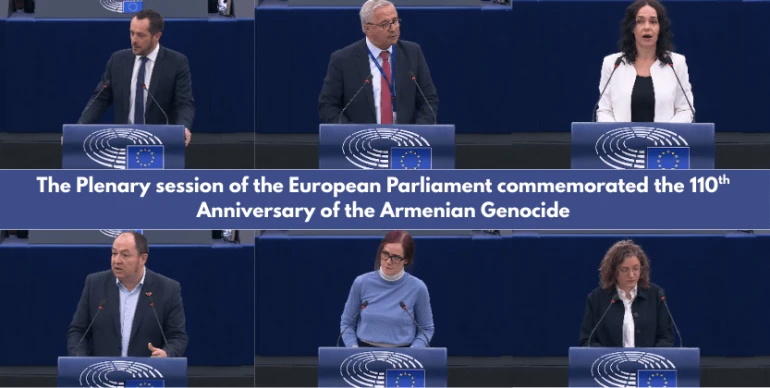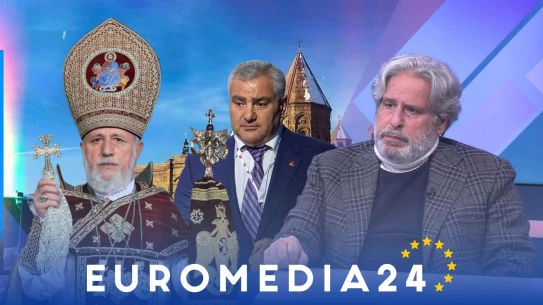During the April 3 plenary session of the European Parliament, the 110th anniversary of the Armenian Genocide was specially commemorated. Many members of the European Parliament stressed the deep parallels between this historical tragedy and the recent compulsory deportations of ethnic Armenians from Nagorno-Karabakh. The parliamentarians called on Turkey and Azerbaijan to recognize the Armenian Genocide as a key step towards reconciliation and strongly criticize the continued cooperation with Azerbaijan, despite its actions. According to the ARF Dashnaktsutyun Bureau's Central Committee.
From the EPP faction, Miriam Lexman stressed the main connection between recognition and reconciliation, noting. "It is the only way to recognize and recognize the only way to normalize relations. Recognition and reconciliation require courage to face the past and the historical truth to build the future. This is more important than ever today, when hundreds of thousands of people were displaced from Nagorno Karabakh due to the atrocities committed by Azerbaijan. "
Continuing the idea of the previous speaker from the socio-democratic political group of the parliament, he said. "It reminds the recent events in Nagorno Karabakh, when hundreds of thousands of people had to leave their homes, and their cultural heritage was subjected to systematic destruction. This is a painful reminder that the past without memory and recognition will be repeated. " Manatio also compared to the Ottoman Empire's persecution of the Ottoman Empire between the persecution of the Armenians and the forced Nagorno-Karabakh, noting that his family became the victim of those persecutions, becoming a refugee. He called on the EU to increase the pressure on Turkey to recognize the "crimes of its past."
Nicolas Bay from the faction of the European Conservatives and Reformists, emphasizing the historical context and the current threats, noted. "110 years ago, the Armenian people were subjected to a terrible genocide, which has not yet recognized that crime. For 110 years, they have tried to seize Armenian lands and eliminate the Armenian people. " He also warned about negotiations on the Armenia-Azerbaijan peace agreement. "Let's not be naive. Azerbaijan's demands show Baku's bad intentions. We must stand by the Armenian people and ensure that any agreement with Turkey and Azerbaijan be based on the recognition of Armenia's territorial integrity and the rights of the Armenian people. "
The role and responsibility of the European Union in the conditions of this historical parallels and the ongoing crisis were deeply criticized during the plenary session. Marketa Gregorova (Greens) questioned the loyalty to EU values, noting that the mention of past crimes should turn into actions against present injustices. "We can't continue to close our eyes when it is convenient for us." Gregorova emphasized the forced deportation of Armenians from Nagorno-Karabakh, while noting that EU countries continue to import gas from Azerbaijan and maintain cooperation with Baku. It was his call. "Let's support Armenia, the last democracy left in the region."
At the same seriousness, Pernando Baren Arza (left) also touched upon the incident openly "Ethnic Clean". He called on the EU to decisively condemn Azerbaijan's actions and not to forget the fate of Armenian refugees and political prisoners, which are subjected to "false trials and judgments." Barena Arza insisted that the EU should have more active involvement, forcing Azerbaijan to change its behavior and prevent further violence by Azerbaijan and Turkey.
Summing up this deep analysis of the present and past, Marie Tusen (Greens) stressed that the Armenian Genocide remains "open wounds in the memory of the Armenian people and Europeans." He stressed the moral debt to maintain this memory and fight the denial. Tumen has linked the historical justice of the genocide with the current suffering of the Armenian people, pointing to hundreds of thousands of people who are imprisoned in Azerbaijan, who are deprived of the right to return. The MP also touched upon the consequences of the EU-Azerbaijan energy policy. At the end of the speech, the deputy noticed: "History is repeated in other ways, but with the same impunity."
The plenary session clearly demonstrated the condemnation of the European Parliament on ethnic cleansing in Nagorno Karabakh, confirming that the recognition of the Armenian Genocide is the cornerstone of peace and reconciliation in the region. Parliamentarians have called on EU member states to adopt a more consistent and principled foreign policy that prefers human rights and international law, in economic interests.
The ARF Dashnaktsutyun's ARF Dashnaktsutyun's Office of the Armenian National Committee, which is represented in 14 European countries, expresses its deep gratitude to the deputies who have commemorated the Armenian Genocide victims, especially for violently displaced Armenians. Commenting on this issue, the President of the European Union's European Office highlighted the criticism of a number of deputies on the EU Executive Power, noting the lack of political will, as well as appropriate respect for the victims of that crime.


